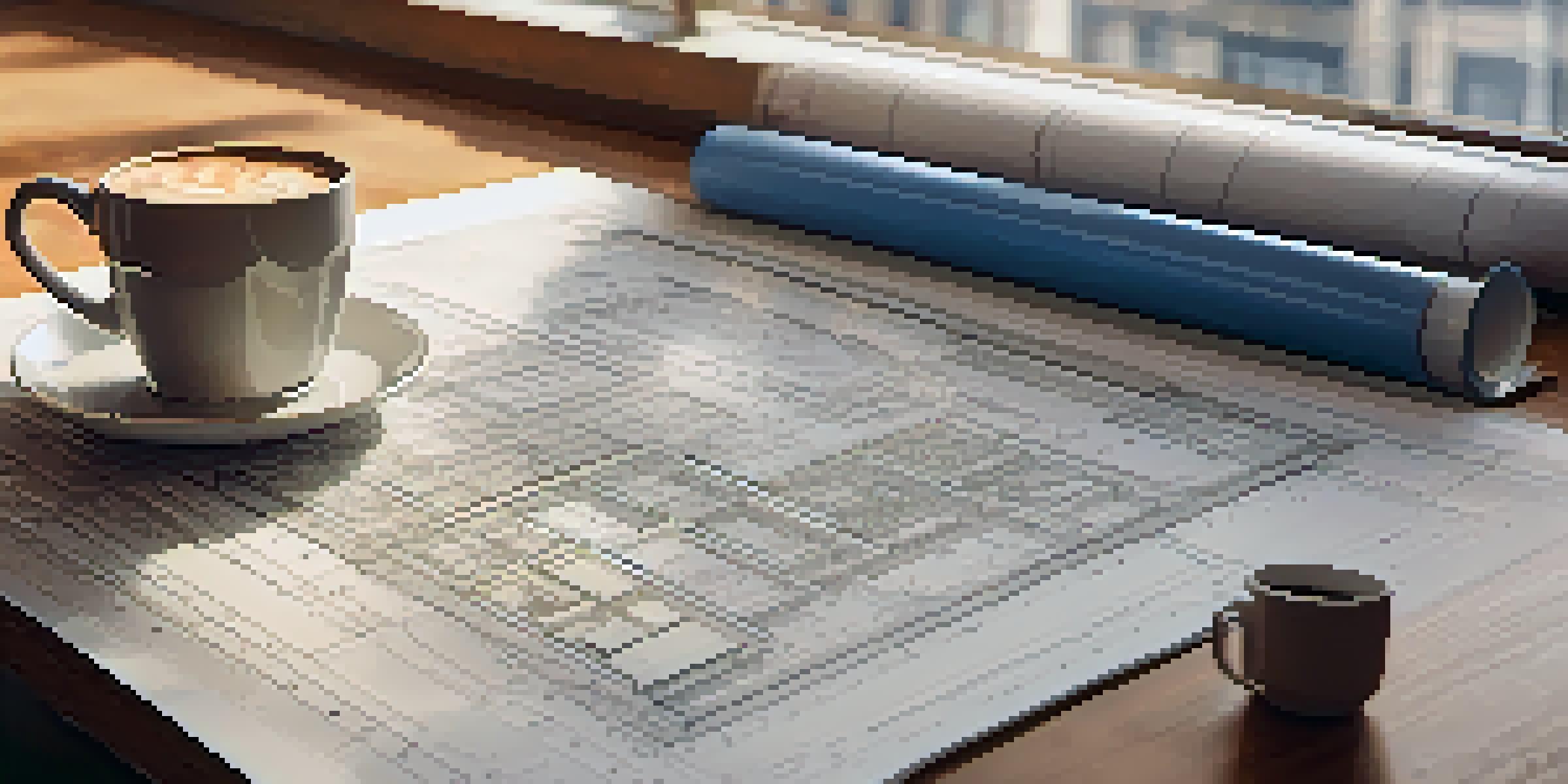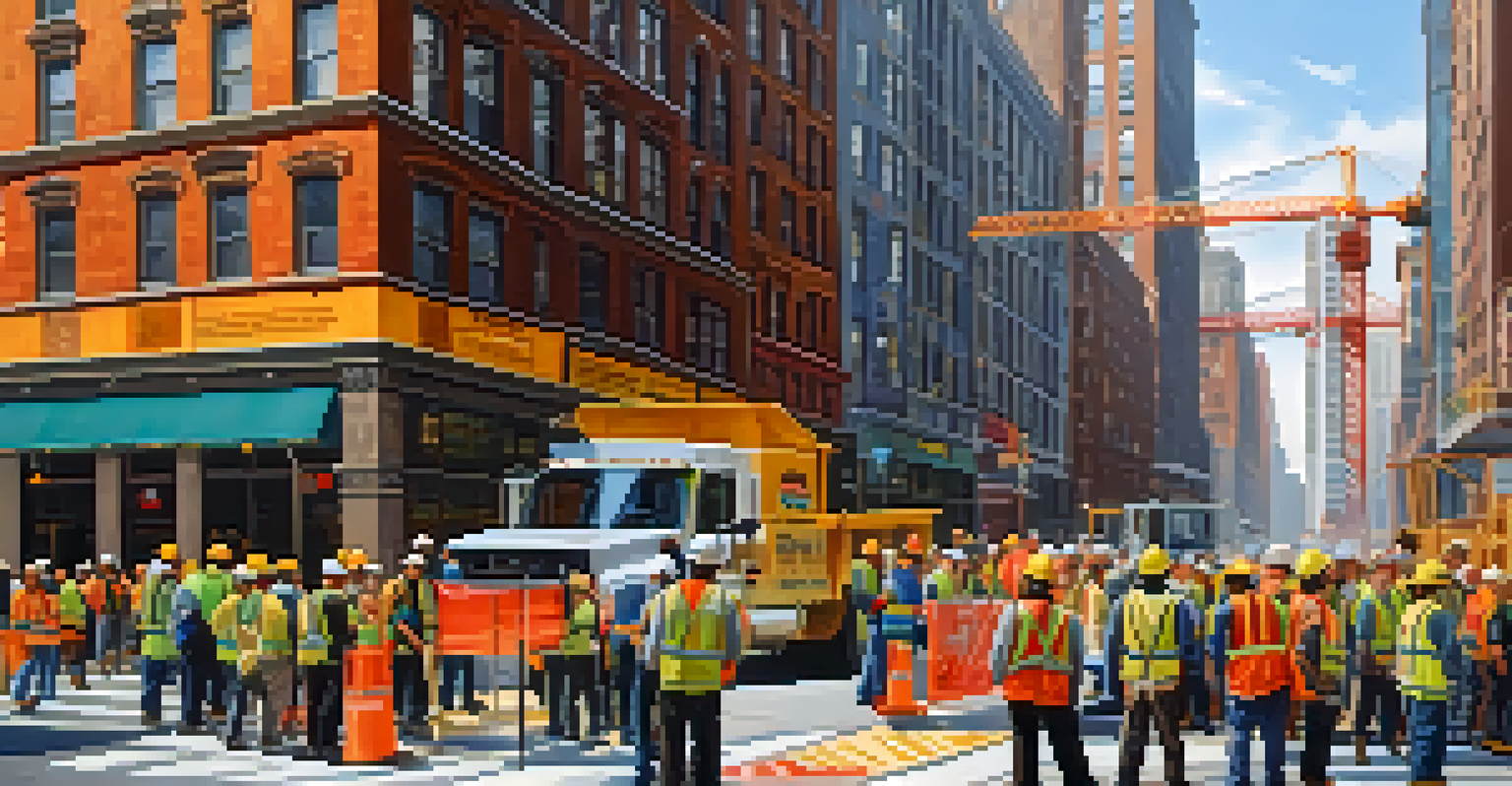Navigating NYC Building Codes for Real Estate Projects

Understanding the Basics of NYC Building Codes
New York City’s building codes are comprehensive rules that govern construction and renovation projects. They ensure safety, accessibility, and sustainability in all buildings. Familiarizing yourself with these codes is essential before embarking on any real estate project.
An ounce of prevention is worth a pound of cure.
These codes cover everything from structural integrity to fire safety and zoning regulations. They are designed not just to protect the inhabitants but also to enhance the overall quality of life in the city. Understanding these basics can save you a lot of headaches later on.
Think of building codes as the rules of a complex game; knowing the rules helps you play better. Ignoring them can lead to costly fines, project delays, or even legal issues. So, investing time in understanding these codes is crucial for any successful project.
Key Building Codes to Consider for Your Project
When diving into NYC building codes, several key regulations come into play, such as the New York City Building Code (NYCBC) and the Zoning Resolution. The NYCBC lays out detailed rules for construction standards, while the Zoning Resolution dictates how land can be used and developed.

For example, if you're planning a residential building, you'll need to consider the allowable height, density, and even the required setbacks from the street. Each of these factors can significantly impact your project's feasibility and cost.
Understanding NYC Building Codes
Familiarizing yourself with NYC building codes is essential to ensure safety, compliance, and the overall success of your construction project.
Understanding these codes is like having a roadmap for your project; it guides you through the complexities of construction. Being aware of what’s required upfront can streamline your process and help ensure compliance with local regulations.
The Importance of Permits in NYC Construction
Obtaining the right permits is a critical step in navigating NYC building codes. Permits validate that your project complies with all relevant regulations and codes, ensuring safety and legality. The city requires different types of permits depending on the scope of your project, from simple renovations to large-scale constructions.
The road to success is always under construction.
For instance, a minor renovation might only require a work permit, while a significant alteration could necessitate a full construction permit. Each permit comes with its own set of requirements and timelines, which can complicate your project if not properly managed.
Think of permits as the green lights you need to move forward. Without them, even the smallest changes can lead to fines and project stalls, so understanding what you need and when is vital.
Navigating the NYC Zoning Resolution
The NYC Zoning Resolution is another key component in navigating building codes. It dictates how land in the city can be used, influencing everything from residential to commercial developments. Understanding zoning laws is essential as they impact what you can build and where you can build it.
For example, if you want to convert a commercial property into residential units, zoning laws will determine if that’s permissible. These laws can also affect the building's height, bulk, and even its design, making it important to factor them into your planning.
Importance of Permits
Obtaining the right permits is crucial as they validate compliance with regulations, preventing potential fines and project delays.
Navigating zoning regulations may feel like piecing together a puzzle. Working with a knowledgeable architect or zoning consultant can help ensure that your project aligns with these crucial regulations.
Working with Architects and Building Professionals
When tackling NYC building codes, collaborating with experienced architects and building professionals can make a world of difference. These experts understand the intricacies of the codes and can help ensure that your project meets all requirements from the outset.
An architect can guide you through the design phase, ensuring compliance with both building and zoning codes. They can also help navigate the permitting process, which can be a daunting task on your own.
Think of them as your trusted guides through a complex landscape. Their expertise can save you time, money, and stress, allowing you to focus on your vision for the project.
The Role of Inspections in the Construction Process
Inspections are a critical part of the construction process in NYC. These checks ensure that your project adheres to building codes and safety standards at various stages of construction. Failing an inspection can lead to significant delays and additional costs, so it’s essential to be prepared.
Typically, inspections occur at key milestones, such as after framing, before drywall installation, and upon completion of the project. Each inspection serves to verify compliance with the NYC Building Code and other relevant regulations.
Navigating Zoning Regulations
Understanding the NYC Zoning Resolution is vital, as it dictates how land can be used and impacts your project's design and feasibility.
Think of inspections as quality control checkpoints in your project. They help catch any issues early, allowing you to address them before moving forward, ultimately saving you time and resources.
Common Challenges When Navigating Building Codes
Navigating NYC building codes can come with its own set of challenges. From understanding complex regulations to dealing with bureaucratic delays, the process can feel overwhelming. Common issues include conflicting codes, permit denials, and unexpected inspection failures.
For instance, you may find that your project meets building codes but runs afoul of zoning regulations. This can lead to costly redesigns or delays in getting the necessary permits. Being proactive in identifying potential challenges can help mitigate these risks.

Managing these challenges is like preparing for a long hike; being aware of the terrain ahead can help you navigate obstacles more effectively. With careful planning and the right support, you can successfully overcome these hurdles.
Tips for Successfully Navigating NYC Building Codes
Successfully navigating NYC building codes requires diligence and preparation. Start by thoroughly researching the codes and regulations applicable to your specific project. This foundational knowledge will empower you throughout the planning and construction process.
Another helpful tip is to maintain open communication with city officials and your project team. This transparency helps ensure that everyone is on the same page, reducing the likelihood of misunderstandings or mistakes.
Finally, don't hesitate to seek guidance from professionals experienced in NYC building codes. Their insights can help you avoid common pitfalls and streamline your project from start to finish, leading to a successful outcome.